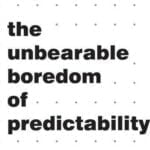It’s true that most on-air personalities believe the content they create is exceptional. They’re prideful, stubborn, confident, smart, and more times than not, have a good grasp on what the audience expects from them.
They also know what fuels their own personal interests. A programmer may offer specifics of what the audience is looking for, and they’ll nod in agreement and provide lip service to satisfy the request. But, when the light goes on, and the microphone is in front of them, many ignore the facts, and gravitate to what they enjoy talking about most.
If you’re in a building where ratings don’t matter, that might not be a bad thing. Having an on-air personality provide passion through the speakers, and treat the audience to something they’re personally invested in usually works out ok. One can argue that a talk show host who’s emotionally connected to a st ory, offers more value than a talk show host who delivers content that benefits the listener, but not themselves.
 However, if you’re in a situation where ratings DO matter, or pleasing your audience is a priority, then you may want to go beyond the surface to get your questions answered.
However, if you’re in a situation where ratings DO matter, or pleasing your audience is a priority, then you may want to go beyond the surface to get your questions answered.
A host can be a big baseball fan, but if the market doesn’t have a strong desire for that content, you’re bringing a knife to a gunfight. Some on-air talent use social media to gauge interest in topics, and it can be helpful, but they forget that the feedback isn’t always coming from their audience.
What I’m a believer in is studying the trends.
In my previous stops, I’d have producer’s track the content of every segment, and send it to me at the conclusion of their program. I wanted as detailed of a report as possible, and I’d often go back to the audio on-demand platform on my station’s websites to make sure the content checked out in accordance with the report. If it didn’t, the producer was likely to hear from me.
The reason that’s important, is because if I’m going to sit in front of an on-air talent, and tell them I need more of one thing, and less of another, I’ve got to have a good solid reason for my position. Telling them “I feel something” or “I prefer something” isn’t going to win them over, and gain their trust. Showing them how the content is being received, and how it can put more money in their pockets, does.
 In professional sports, scouts, coaches, and team executives spend a large chunk of their time analyzing data. They examine how a hitter responds to different pitches, counts, what their approach is when their team is leading or trailing, and they’ll use the information to create an informed opinion. They then share that feedback with the player to try and help them improve. Assuming they respond to the input and it shows up in their performance, it’s often reflected in the team’s long term commitment.
In professional sports, scouts, coaches, and team executives spend a large chunk of their time analyzing data. They examine how a hitter responds to different pitches, counts, what their approach is when their team is leading or trailing, and they’ll use the information to create an informed opinion. They then share that feedback with the player to try and help them improve. Assuming they respond to the input and it shows up in their performance, it’s often reflected in the team’s long term commitment.
Now let’s think about that from a radio standpoint.
How many personalities and programmers spend time looking at the data from their shows? I’m not talking about an aircheck session where a programmer plays a piece of audio, offers an opinion on it, and the two sides discuss it. That’s a subjective analysis. Depending on the relationship between the PD and Host, it can either be beneficial, or a waste of time.
What I’m talking about is detailed analysis and coaching. This brings the programmer and on-air team together and puts everyone in position to better understand the vision, what’s working, what isn’t, and what matters most to the audience.
 Sometimes talk shows get into a rut. They may follow the same daily routine and not even be aware of it. If there’s little suspense, and the pattern doesn’t take advantage of when people listen or satisfy the audience’s content desires, it can stunt the show’s growth.
Sometimes talk shows get into a rut. They may follow the same daily routine and not even be aware of it. If there’s little suspense, and the pattern doesn’t take advantage of when people listen or satisfy the audience’s content desires, it can stunt the show’s growth.
When was the last time you looked at the number of guests you include on your program each day? How about the length of those conversations, and the times of when they appeared? Maybe they’re a big part of the show’s success, but then again, maybe they’re getting in the way of it.
Have you ever looked at where you field phone calls in a show? How long they’re on the air with you? What topics they respond to most? Do the ratings suffer or increase when you invite the audience into the program?
What about the content you choose to feature each day and the segments where you provide opinions on it? How does the audience respond when you talk football, baseball, basketball, lifestyle, or other subjects? Do you do a specific feature daily or weekly on a set day and time? Is it working or slowing you down? Is it strategically smart to offer a variety of content to your audience, or would they prefer a heavier focus on 1-2 key subjects?
Every programmer and personality should be aware of these things. If a host wants to connect with an audience, and a programmer wants to win, content evaluations should be done frequently. The information is available. All you have to do is invest the time to study it, understand it, and relay it to your people.
 It’s no different than Dusty Baker telling Bryce Harper to look for a fastball on the inside part of the plate on a 2-1 count, because the data says it’ll happen 8 out of 10 times. That research matters. One little tidbit gives the player an edge, and increases their confidence. When they receive knowledge that can help them do their jobs better, they appreciate it. In turn, it makes them more likely to respond to future feedback. They may even notice something you didn’t, which can benefit the entire team.
It’s no different than Dusty Baker telling Bryce Harper to look for a fastball on the inside part of the plate on a 2-1 count, because the data says it’ll happen 8 out of 10 times. That research matters. One little tidbit gives the player an edge, and increases their confidence. When they receive knowledge that can help them do their jobs better, they appreciate it. In turn, it makes them more likely to respond to future feedback. They may even notice something you didn’t, which can benefit the entire team.
A few years ago in San Francisco, I tried to push my staff to take more chances talking NFL. There was an internal opinion that Bay Area listeners only followed the 49ers and Raiders, and while the local teams were a priority, the market had a bigger appetite for football than the staff was giving them credit for. Our competitor was also known for leaning heavy on baseball, so this was an opportunity to establish our position as a strong football focused brand.
I went to work to make my case. I pulled ratings of all of our shows talking about NFL subjects that weren’t 49ers or Raiders driven. I looked at the performance of our NFL Play by Play from Westwood One, which included at the time, the highest rated single event ever on the station – a Patriots-Texans playoff game. I highlighted the local market’s interest on television to national football games, the NFL Draft, and talked about the crowds I witnessed on Sunday’s at local bars when a 49ers or Raiders game wasn’t on the air.
To cap it off, I went around the room and asked each staff member to name their favorite football team. Much to my surprise, 90% of the room pledged their allegiance to teams not named the Raiders or 49ers.
 After going through that exercise, it was easier for the staff to understand why it should be a bigger part of the radio station’s content strategy. The data and visual evidence supported it, and that made it easier for the group to accept.
After going through that exercise, it was easier for the staff to understand why it should be a bigger part of the radio station’s content strategy. The data and visual evidence supported it, and that made it easier for the group to accept.
Sometimes, we get in our own way. We’ll tell ourselves that we know what the audience wants because we want them to like what we personally care about. If they differ in their opinion, we try to sway them towards our way of thinking, rather than making the adjustments ourselves.
But if the content evaluation process doesn’t take place regularly, and you’re not treated to the information that makes your audience tick, then you’re allowing opportunities to pass you by.
I believe that most on-air talent care about the opinion of their Program Director. They want to please the person they work for, even if they don’t show it. They respond quicker to negative feedback than positive, but deep down, they crave the attention and dialogue. They want to know the PD is listening, invested in the show, supportive of their decision making, and has something of value to add. If they don’t, they shut down quickly.
 No matter how many things appear on a programmer’s ‘To Do List’ each day, when they meet with one of their hosts, the talent wants to feel like the only thing that matters is their show. The way the PD guides the meeting and responds to the talent’s questions will determine whether they stay interested or reject further dialogue.
No matter how many things appear on a programmer’s ‘To Do List’ each day, when they meet with one of their hosts, the talent wants to feel like the only thing that matters is their show. The way the PD guides the meeting and responds to the talent’s questions will determine whether they stay interested or reject further dialogue.
Hosts don’t want to be told to deliver a show the way the programmer would. That’s a remedy for creating a giant divide between the two. But, if a coaching session occurs and specific examples, detailed analysis, and audio evidence is provided to help the talent see something they might be missing, they’ll respond more favorably.
Any person on this planet can tell another “I like that, do more of it” or “That doesn’t work, do less of it”. Explaining and showing why, makes all the difference.
If you’re going to hire a highly opinionated person, and ask them to not follow their natural instincts, it won’t work. The only way the feedback takes shape is if they buy into it. When they see the details, and hear your thoughts, it opens their mind. Once they do it, and gain results, it becomes easier to gain future buy-in.
 Once a host trusts your ear, respects your point of view, and knows that you’ve put the time into helping them find a way to connect bigger with the audience, that helps the relationship ascend to a higher level. It affords you an opportunity to create and enjoy future success together. That alone makes doing the research worth it.
Once a host trusts your ear, respects your point of view, and knows that you’ve put the time into helping them find a way to connect bigger with the audience, that helps the relationship ascend to a higher level. It affords you an opportunity to create and enjoy future success together. That alone makes doing the research worth it.
For the sake of this piece, I thought I’d provide a content evaluation I did for an on-air talent. I’ve removed the individual’s name, and changed the market, and only included two segments worth of analysis from their show.
When a talent receives something like this either from their Program Director or Producer, it tells them you care about their show and have a grasp on what they’re doing. It’s important to provide positives, as well as constructive criticism because the only way someone improves is when they hear both.
The one thing I’d suggest is to send this to the host after the show. That allows them to keep their on-air focus, and discuss it with you once they’ve had time to disconnect from the program and process the critique. They may not agree with every part of your assessment, but they’ll respond to your analysis, and appreciate you for doing it.
OPENING SEGMENT:
- Red hot out of the gate by proclaiming “The Minnesota Wild are done” – this instantly grabs the audience’s attention on the day when the Wild are facing an elimination game in the Stanley Cup Playoffs.
- You dive right in on hating to be the bearer of bad news, but you believe in being honest, and you see no evidence that supports a way for the Wild to avoid elimination.
- After setting the scene for the game, you give out the # (you’re more than welcome to try and change my mind) and use a good boxing analogy to further establish the point – “the Wild are that fighter that’s getting worn down round after round, and you’re not sure if they’re going to get knocked out early, or hang on to lose by decision, but you know they’re not leaving the ring victorious“.
- GREAT one-liner “The 40 Year Old Virgin is scoring more than the Wild” to emphasize the team’s biggest problems (Let that line hang out there for a second – being in a rush to hit the next point can take away from the impact).
- Nice job using some key stats to paint the picture and support your case (0 goals in 175 of 180 minutes this series – the Wild went 20 mins without a shot last game, and they’re 2 of 26 on the Power Play) – clever line used “stats are like bikinis, they show some things but not all“, and followed up with a dose of truth “even if you want to believe in this team tonight, every key piece of information goes against them – this is why I’m struggling to see a way for them to win.”
- Halfway through you tease NFL Draft/#1 Pick selection in 5 minutes – you’re going to tell the audience what the biggest mistake the Bucs could make with the 1st overall pick – good suspense and topical.
- Back to the Wild elimination game talk, and another quick one liner about Zach Parise being on a milk carton and missing – please alert the authorities if you see him – (these one liners are quick and memorable, just be careful of not overdoing it).
- You offer up the other side of the topic to provide some hope – one thing, be careful about playing both sides of the fence – it’s ok to explain it but reaffirm where you stand. Let the audience offer the other side to counter your position.
- Mid-segment, you offer more analysis on why the Wild are unlikely to prevail and toss to audio of Wild Head Coach Mike Yeo which brings the momentum to a screeching halt (there’s no emotion, opinion, or drama in what he’s saying. If the audio doesn’t fire you up or add something new to the content, skip it – don’t use audio just for the sake of incorporating it).
- Text line response from a listener who’s pissed at you for painting a negative picture in advance of tonight’s playoff game (Bleep You Dude) – funny, and offers you an opportunity to reset and remind people why you don’t see the game turning out well.
- – The content now switches to the NFL Draft (reset here, give your name and remind the audience you’re subbing for the afternoon host) – nice job of setting the scene by sharing how you struggle in life with over-analyzing things, and explaining why the Bucs can’t operate the way you do with this year’s #1 pick.
- GREAT opinion and explanation on why Tampa can’t trade the pick – “if you look at the last 10 teams to win a SB, they all had Top 10 QB’s when they won. 50% of all 1st round picks turn out to be busts. Jameis Winston will be a Top 10 QB. That’s what you need to win. You can offer 4 first round picks & my answer is NO. He’s the best QB prospect the past 10 years not named Andrew Luck. His arrival takes the Bucs to 6-8 wins” – Great confidence & insight, and a relatable subject. Really good content.
- Teasing to break – At 3:30, former Minnesota hockey player Brian Bellows drops by, has his opinion of Zach Parise changed? But coming up next, nobody in Minneapolis realizes how special this could be (good suspense).
- *Try not to tease 2 things heading into a break – people rarely remember both – stick with what’s next. Overall this was an excellent start to the show…..great attention grabber with the opening statement – The Wild Are Done! On the day of a playoff game, you have their attention, even if they dislike the opinion…..you laid out your case for why you feel the way you do, and used facts and color to do so. A lot of it makes sense. Now it’s the audience’s job to poke holes in your theory and try to change your mind.
- Midway through I liked the switch to the NFL Draft and the commentary on why the Bucs can’t consider trading the #1 pick. It was strong. When an audience hears a host say “you can offer 4 1st round picks for the #1 overall pick and the answer is NO, the pick is not for sale” their ears perk up…..that’s gutsy, interesting, and offers room for a strong pro/con discussion on the topic. Given that we’re 1 week away from the NFL Draft and you’re in a football rich market, this will be well received. We can debate if Winston is a Top 10 QB, on the same level with Andrew Luck as a prospect, etc. but that’s what makes it fun. Really interesting topic, laid out well.
SEGMENT #2:
- You start off giving the station call letters and your name and dive right into a tweet that criticizes your opinion on the Wild – nice response explaining why you don’t believe they can win tonight (Be sure to reset the topic first before the tweet since people who missed the opening segment know what you’re talking about and can play along.)
- The transition is made to resetting the NFL Draft talk – “the biggest mistake the Bucs can make next week is trading the #1 pick” – no price is high enough to deal it, Jameis Winston is going to be a Top 10 QB, a Ben Roethlisberger clone, and if the Bucs don’t take him, it’ll hurt their franchise for years to come“. One suggestion, although NFL fans follow the entire league, local people care most about the team in their own backyard. Consider how to make this relatable to Vikings fans by pointing out a previous draft blunder they made, and how it impacted them. Then relay how the Bucs passing up Winston would compare. That’s just another way to add an extra layer to the topic.
- Quick Text – what round are the Bucs drafting Jameis’ babysitter? Clever response from the audience, good job responding to it.
- You then take a call from Hugh who adds “you took off your fan cap and put on your radio hat to fire up the audience and get them to call in about the Wild” – After explaining that you don’t do shock jock content, Hugh asks about the top 2 QB’s entering the draft & asks about the hockey spirit and why the Wild are allowing fundamental mistakes to hurt them.
- *** The caller placement in this segment stunted the Jameis topic which could have been gold – the previous tease was about something being special in Tampa – was that about the Bucs/Jameis or something else? Make sure you’re clear so the audience gets a payoff for what they were promised. Don’t leave them to guess, make it easy to play along.
- Good move mentioning that the opinion may be harsh and it might have required some massaging, especially on the day of an elimination game, but maybe I can make it up to you by offering you this – the Minnesota Twins are going to the post-season this year – book it! ***This is a strong opinion, sure to fire up local baseball fans, and it shows that you’re not against the local team’s and their success. Your proclamation gives every local baseball fan the one thing they all crave – hope! I’m guessing this is what the tease was about right?
- That leads you to explaining that people outside of Minneapolis have no idea how good the Twins are. You point out how good their youth is and how they’ve won 6 of 8 despite injuries, and have one of the better young rotations in baseball, and run scoring is a half point higher. Those are all good reasons for explaining why you’re optimistic about them. You then set the scene on the wildcard picture and explain how you believe the Astros will come back to earth, and the other spot up for grabs is a complete crapshoot.
- * If the Twins need to secure 1 of the 2 wildcard spots, tell me how they measure up against the teams that are going to be in contention. How do they going to stack up to the teams in their division and to some of the more formidable teams in the race – Astros, Yankees, Angels, Rangers, Blue Jays, etc. Explain the obstacles in their way, and why they’ll pass those other clubs and prove the experts wrong!
- Tease – Brian Bellows next, is his perception of Zach Parise changing? He tells us next (Very good – one focused item, with a question that leaves the audience thinking).
FOUR KEY TAKEAWAYS:
- Let your bold statements, strongest opinions, and one-liners hang out there for a second – it allows people to process things and ask “What? Did he just say that?” For example, “the 40-year Old Virgin scores more than the Wild”, “If you offer me 4 1st round picks for this #1 pick, I’m not interested”. Both were great, but didn’t have a chance to settle. Let it bake for a second.
- Pay off your teases – they’re excellent going to break, but when you come back they’re not always provided or made clear – it’s not only about teasing content, it’s important to deliver on what you promised too. Not doing it will frustrate your audience. I love what you’re doing to keep them curious. Just make it easier when you return.
- Using Audio – GREAT audio can make a segment, BAD audio can break one. If it doesn’t provide emotion, drama, suspense, humor, or an ounce of information to support or counter your opinion, don’t feel obligated to use it. Think of the soundbite as being a prop in your show. It’s supposed to enhance the overall content experience. If it’s getting in the way of your best material, leave it out.
- Segment 1 vs. 2 – The first one flowed nicely, and offered a mixture of strong opinion, quality information, and humor. You went 7-8 minutes on the lead story, before switching to a secondary topic, which also provided many of the same qualities. It was an excellent start to the program and easy to follow…..now contrast that with your second segment, which started without letting folks know what you were hot on, and then switched into a quick discussion on the #1 pick, a text on that subject, a caller on the NHL playoff game, and conversation on the Twins…..It’s ok to change topics, but make the direction easy for the audience to follow…..if in segment #1 you were on a highway and got off to take a side road to reach your destination, segment #2 you were on a side road, headed back to the highway, got off the next exit, hoped to find an alternate road, stumbled onto one which wound up working out but added time to your trip…..lots of good material, all a matter of connecting the dots to make it easy to process.

Jason Barrett is the President and Founder of Barrett Media since the company was created in September 2015. Prior to its arrival, JB served as a sports radio programmer, launching brands such as 95.7 The Game in San Francisco, and 101 ESPN in St. Louis. He also spent time programming SportsTalk 950 in Philadelphia, 590 The Fan KFNS in St. Louis, and ESPN 1340/1390 in Poughkeepsie, NY. Jason also worked on-air and behind the scenes in local radio at 101.5 WPDH, WTBQ 1110AM, and WPYX 106.5. He also spent two years on the national stage, producing radio shows for ESPN Radio in Bristol, CT. Among them included the Dan Patrick Show, and GameNight.
You can find JB on Twitter @SportsRadioPD. He’s also reachable by email at Jason@BarrettMedia.com.





